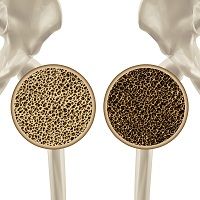Beta Blockers Could Solve Antidepressant Bone Loss Problem
Selective serotonin reuptake inhibitors (SSRIs), popularly used as antidepressants, can have a negative impact on bone density. Beta blockers may be able to prevent that.

Beta blockers can intercept the brain's signal for bone loss after treatment with the antidepressant fluoxetine, according to research published in Nature Medicine.
Researchers from Columbia University Medical Center used mice models in order to determine how bone loss with antidepressant use could be halted or stopped entirely. The study authors noted that using selective serotonin reuptake inhibitors (SSRIs) has been linked to an increased risk for bone fracture, an association that is poorly understood. Fluoxetine is the most commonly prescribed SSRI, authorized for both mood disorders and nonpsychiatric conditions.
The researchers demonstrated that fluoxetine uses distinct mechanisms to affect bone remodeling.
At first, the researchers said, fluoxetine protects the bone by stopping the osteoclasts, or skeleton cells, from constantly breaking down and reabsorbing bone material. But after extended use, such as a few weeks of treatment, fluoxetine changes the brain signal that counteracts the osteoclasts' function and also negatively affects bone formation, which contributes to bone loss.
Using a low dose of the beta blocker propranolol, the researchers were able to neutralize the effects of bone loss, this time due to epinephrine in the bloodstream. The researchers did not observe any bone loss or behavioral changes in the mice while they were being simultaneously treated with fluoxetine and propranolol, leading them to believe that the fluoxetine's effect on the brain and mood was continuous while preserving bone structure.
This beta blocker could block an SSRI's negative effect on bone mass, study leader Patricia Ducy, PhD, concluded in a press statement, and could in the future be important both premenopausal and postmenopausal women, who are already at a greater risk for developing osteoporosis.
Related Coverage:
Continuing Treatment in Postmenopausal Women with Osteoporosis
ACR Proposes Recommendations for Glucocorticoid-Induced Osteoporosis